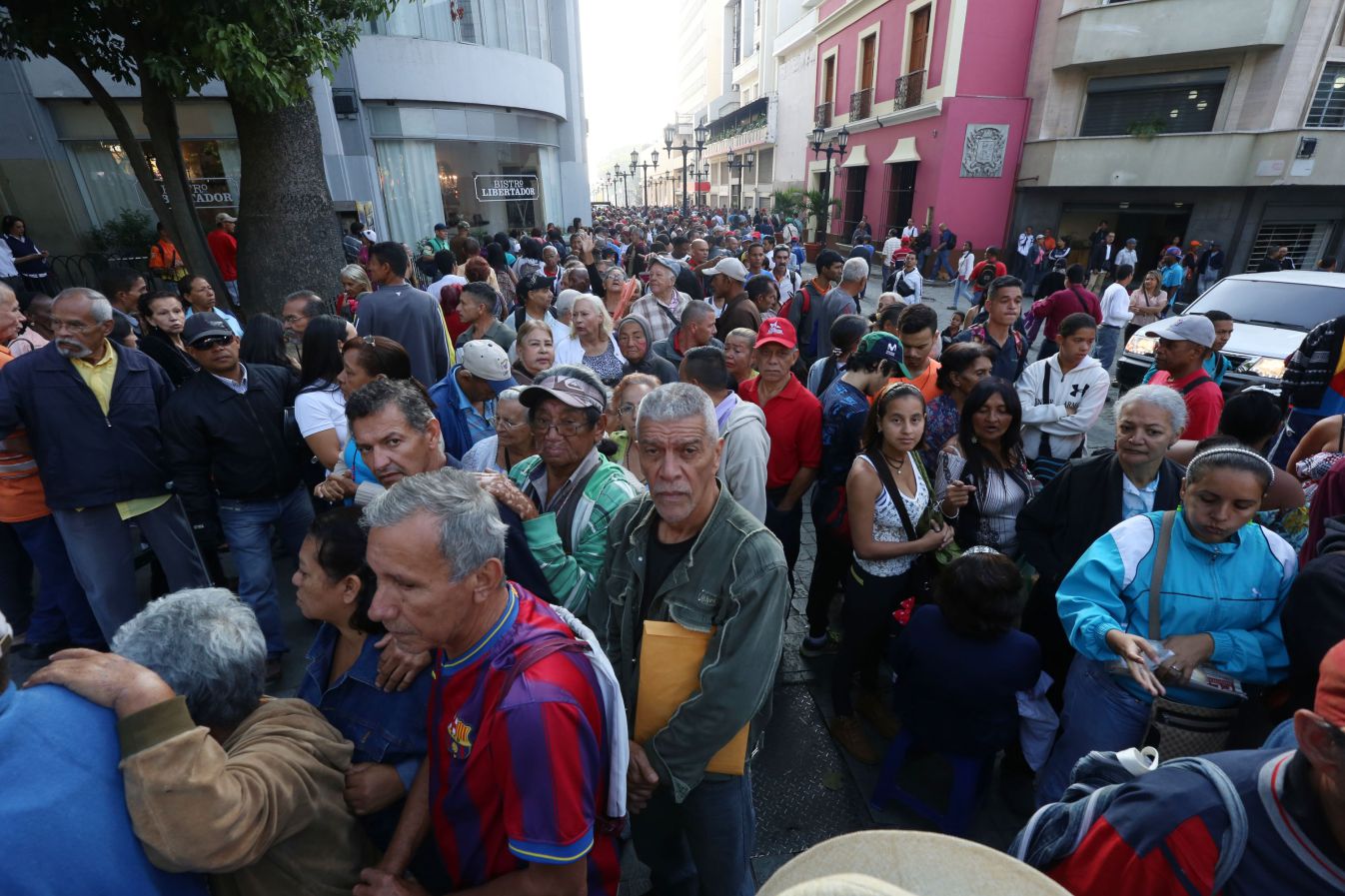In the Carnet de la Patria we trust
Venezuelans line up for hours to get their hands on Maduro's latest proposed solution to all their problems. But nobody's sure of what it is or how it works. So they wait in line hoping to find out.


It was a super hot Saturday in the Centro de Caracas, our teeming, disgusting downtown, and a big mass of people were screaming and complaining about the chaotic line for the Carnet de la Patria — the hazily explained new Membership/ID card the government now insists we all have.
“There’s no one in charge here, no one”, one lady told me. She was maybe 55 and trying to shield herself from the sun with a piece of cardboard that she found in the trash. She’d been standing there since 5 am; it was 11:30 a.m. not even one person in line had gotten the coveted carnet.
These lines are big even by Caracas standards, and they’re made all the creepier by the fact nobody knows what the carnet is for exactly.
“You have to come here de corazón,” she said. “I owe a lot to la revolución and to Chávez, I want to prove that I’m a real chavista”.
Days earlier, a friend asked if I thought we really needed this “Carnet de la Patria”, my answer was simple: “No,” I said, then thought better of it. At least not por ahora.”
These long queues to get the Carnet are making me second guess myself. There’s nothing new about lines in Caracas, but these lines are big even by Caracas standards. And they’re made all the creepier by the fact nobody knows what the carnet is for exactly.
By the time I get to this line, people had spent more than seven hours waiting.
 “I’m doing this because I want my ‘bolsa CLAP’,” —my PSUV-delivered grocery bag — “and maybe a credit from the government, for my business (…) you have to be with la revolución to make that happen”, a young man told me.
“I’m doing this because I want my ‘bolsa CLAP’,” —my PSUV-delivered grocery bag — “and maybe a credit from the government, for my business (…) you have to be with la revolución to make that happen”, a young man told me.
The Carnet de la Patria is the last in a creepy, creeping set of “carnetization” efforts the government’s increasingly keen on. First, there was a carnet for all the “Misiones”, then they offered the “Carnet del Psuv”, for the party faithful.
“I’m doing this because I am a chavista”, an older man with a PSUV cap, jeans and a red t-shirt told me, “I don’t know what I’m going to do with it, but I can at least use it to show to all the opposition people that I’m chavista, from the bottom of my heart (…) we are more and we are here pa’ lo que venga“.
“It sucks to be here, but a friend told me that someone told her that if she doesn’t have the Carnet de la Patria over the next month, they are not getting the CLAP bag”, a lady in ther mid-30s told me, looking tired as she tried to find a place to find an affordable bottle of water. “Everyone has the Carnet, even a friend, that is “escuálida”, already has the carnet, you know… just in case”.
Around 12 o’clock the first person in line finally got the Carnet. A group of young guys were in charge of all the process, they belong to defunct diputado Robert Serra´s Brigades. In the process, they ask for your name, address, Twitter, Facebook, Instagram and if you are part of any of the “Misiones del Gobierno”. They also ask which political party you support, too.
“Maybe I’m going to need this for food or medicines,” a young lady holding a baby in her arms tells me. “I don’t know, but we are seven in my family, and only two with a steady job, I can’t afford to lose my CLAP bag or my tarjeta.” I ask her which tarjeta she’s talking about, and she shows me her Tarjeta Hogares de la Patria a giveaway scheme for mothers worth Bs.50,000 to her each month — 7.000 Bs more that the minimum salary.
They ask for your name, address, Twitter, Facebook, Instagram and if you are part of any of the Misiones del Gobierno. They also ask which political party you support, too.
The former governor of Cojedes state and now Urban Agriculture Minister — the low-key but powerful Erika Farías — told Mario Silva that, in the future, the Carnet de la Patria will work as a debit card for the payment of CLAP bags: “If my family loses the CLAP bags we can’t afford to buy rice, milk or pasta. At the market, everything is too expensive. Maduro said in TV that with the Carnet they will be able to know the needs of the people, so maybe, if I’m lucky enough, i will get a house”, the young mother explains to me.
“I don’t have a house, maybe after this I will get one, who knows, you have to try”, a guy working as a mototaxista told me. He was looking tired, still with the helmet of the moto attached to the bell and eating an empanada and Malta. “In Venezuela you have to have faith, it’s the only way. I hope that this government gives me a house, and that the CLAP bags get better, that’s why I’m here”.
Caracas Chronicles is 100% reader-supported.
We’ve been able to hang on for 22 years in one of the craziest media landscapes in the world. We’ve seen different media outlets in Venezuela (and abroad) closing shop, something we’re looking to avoid at all costs. Your collaboration goes a long way in helping us weather the storm.
Donate




